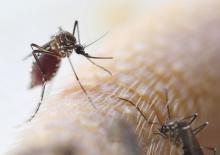SAN DIEGO – When compared with pretravel blood screening, new arboviral infections were detected in 7% of U.S. athletes and support staff who attended the 2016 Olympic Games in Rio de Janeiro, according to study results revealed at an annual scientific meeting on infectious diseases.
Although the prospective screening program was largely set up and driven by concern about the risk of Zika virus infection, this was not among the arboviral infections identified, reported Krow Ampofo, MD, professor of pediatrics in the division of pediatric infectious diseases, University of Utah, Salt Lake City.
Six months prior to the Olympics, the rising rate of suspected and confirmed cases of Zika virus had produced significant concern among athletes planning to attend the games, according to Dr. Ampofo. As a result, clinicians at the University of Utah, who were engaged to provide several types of health care to the U.S. Olympic team, planned a pretravel evaluation of arboviral infections with a post-games follow-up.“The stories and images of children with microencephalopathy and other complications of the Zika syndrome were a major concern of athletes,” said Dr. Ampofo, who noted that many were threatening not to attend. The concern was reasonable, he said, given the scope of the epidemic and the fact that the majority of female athletes were of reproductive age.
At the time the screening program was being planned, the Zika virus epidemic in Brazil had, in fact, already peaked. Although it was not then known that the peak had been reached, the incidence rates began falling sharply beginning in about March 2016. New cases still were being reported, but the threat was greatly diminished by the time that the summer games were held.
In the screening program, blood samples were obtained prior to the games from 950 U.S. athletes and support staff. In most cases, these samples were obtained in Houston, where the Olympic team was processed just prior to departure. At that same time, the U.S. Centers for Disease Control and Prevention provided pretravel counseling about infection risk prevention.
For follow-up, the goal was to obtain blood samples within 2-12 weeks after return of all those who participated in the pretravel screening. Completion of a post-travel survey about activities in Rio de Janeiro, particularly their participation in risk prevention strategies, also was requested.
Blood samples were evaluated for four arboviral infections: Zika virus, dengue virus, chikungunya virus, and West Nile virus. The calculation of infection rates was based on the 457 (48%) of those screened prior to travel who provided blood samples after their return. Of these, 11% had antibody evidence of arboviral infections, but new infections were confirmed in only 7%.
The post-games survey was completed by 169 of those evaluated. A comparison of risk prevention behaviors in those who were and were not infected suggested that use of mosquito repellent did provide risk reduction, said Dr. Ampofo.
The substantial rate of new West Nile virus infections was “surprising,” Dr. Ampofo said. He recounted that there were no prior warnings from Brazilian authorities that West Nile virus was circulating. Infection with West Nile virus in Houston prior to departure was not considered an alternative explanation. According to Dr. Ampofo, Houston was not an endemic area for West Nile virus, and the stay in Houston for most athletes was 2 or 3 days.


